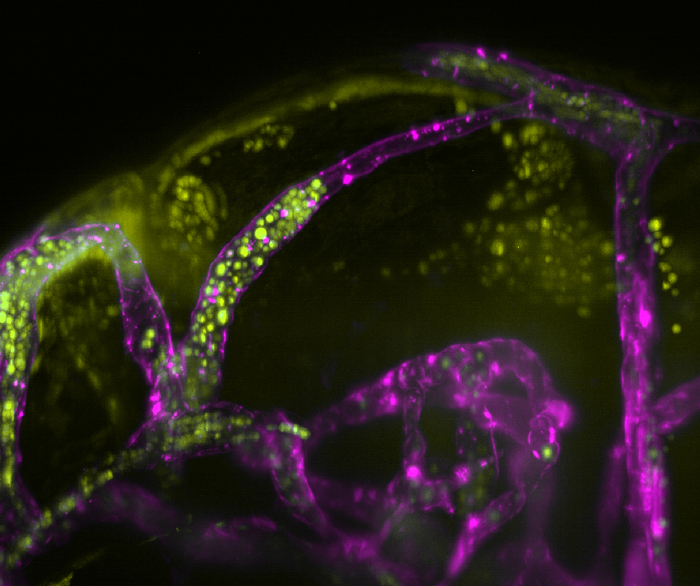New research from the University of Sheffield has revealed how fungus blocks and bursts blood vessels in the brain, helping scientists better understand how meningitis starts.

Credit: University of Sheffield
- New research from the University of Sheffield gives scientists a better understanding of how meningitis spreads, paving the way for new treatments
- Groundbreaking study shows Cryptococcus neoformans helps the life threatening infection spread from the blood by blocking and bursting blood vessels
- An estimated 2.5 million cases of meningitis occur globally each year
- The findings will also help researchers better understand other blood vessel related diseases such as cardiovascular and neurological diseases
New research from the University of Sheffield has revealed how fungus blocks and bursts blood vessels in the brain, helping scientists better understand how meningitis starts.
The study, published in the journal PLoS Pathogens, shows that Cryptococcus neoformans microbes become lodged in blood vessels preventing blood flow and increasing blood pressure. These microbes grow in the small blood vessels causing them to stretch and burst, releasing the infectious microbes into the brain and causing meningitis.
Meningitis is most commonly caused by an infection of the brain and spinal cord and can be life threatening if not recognised and treated very quickly. It is most common in babies, adolescents and those with compromised immune systems and affects an estimated 2.5 million people each year.
Dr Simon Johnston, from the University of Sheffield’s Department of Infection, Immunity and Cardiovascular Disease, said: “The brain has very complex and effective defences against microbes, but we have identified a simple and effective method that microbes may use to escape the blood and enter the brain.
“Previous research has focused on how microbes can break down the defences of the brain or use immune cells as a route into the brain. We can demonstrate how, for some microbes, damaging blood vessels is a very effective method of invasion.
“Our immune system is very effective at recognising and destroying microbes, including in the blood. However, some microbes can escape the immune cells and it is these microbes that would be most effective at using blood vessels bursting as a way into the brain.”
The research was carried out in collaboration with the Agency of Science, Technology and Research (A-Star), Singapore, and the University of Queensland, Australia.
The international research team, led by Dr Johnston, investigated zebrafish larvae to understand how the meningitis infection behaves in blood vessels. The findings will also help researchers better understand other blood vessel related diseases such as cardiovascular and neurological diseases.
Dr Johnston added: “We started this research because we knew there was unexplained blood vessel damage in some meningitis patients. We are now working to find new treatments for these patients.
“The infections causing meningitis can be treated with antimicrobials but patients are often very ill and a lot of damage can be caused before treatment is effective. This will be made worse by the ongoing global increase in antimicrobial resistant infections.
“We are using the knowledge we have gained from studying how meningitis can spread to understand how to reduce the damage caused to the brain while treatment takes place.”
The research was funded by the Medical Research Council, A-STAR Institute of Molecular and Cell Biology and Wellcome Trust Strategic Award for Medical Mycology and Fungal Immunology.
Journal
PLoS Pathogens
DOI
10.1371/journal.ppat.1010389
Method of Research
Experimental study
Subject of Research
Animals
Article Title
Blood vessel occlusion by Cryptococcus neoformans is a mechanism for haemorrhagic dissemination of infection
Article Publication Date
21-Apr-2022




